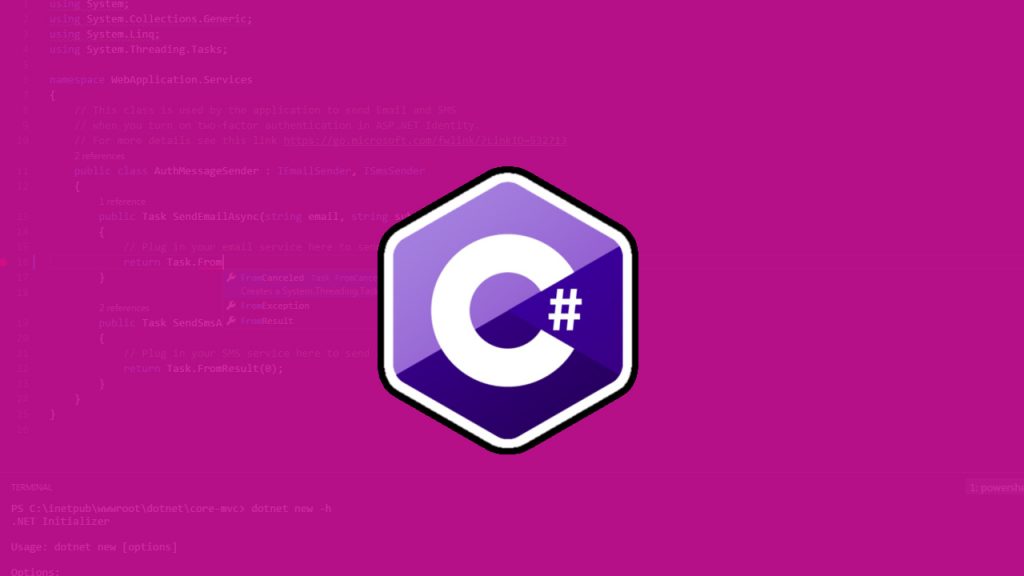C# is a general-purpose, multi-paradigm programming language that encompasses static typing, strong typing, lexically scoped, imperative, declarative, functional, generic, object-oriented (class-based), and component-oriented programming disciplines.
C# was developed by Microsoft around 2000 as part of its .NET initiative and later approved as an international standard by Ecma (ECMA-334) in 2002 and ISO (ISO/IEC 23270) in 2003. Anders Hejlsberg designed it, and Mads Torgersen currently leads its development team. C # is one of the programming languages designed for the Common Language Infrastructure (CLI). The most recent version is 9.0, which was released in 2020 in .NET 5.0 and included in Visual Studio 2019 version 16.8.
Mono is a free and open-source project to develop a cross-platform compiler and runtime environment (i.e., virtual machine) for the language.
Who is C# for?
Within the range of beginners and expert developers, C# can be used by people with diverse skill levels. To learn C#, it’s best that you have at least a basic understanding of writing code, even if you have yet to build your first program or application.
The learning curve for C# is relatively low compared to more complex languages like Java, although it’s not quite as simple to learn as Python, the ultimate programming language for those new to the field.
C# is a great choice for developers with moderate to advanced experience with writing code. While experts acknowledge the language as being of moderate complexity, they agree that it’s fairly simple to grasp and excel in. Once you’re introduced to C# and you put in the time to get the hang of it, you can expect to advance quickly from rookie to expert.
This is because C# is a high-level language, which means it’s relatively easy to read and write. This makes it a solid choice for beginners and a convenient option for experts. In addition to its readability, C# can also be used to automate complex tasks that require a lot of time to achieve minor results.
This programming language is also statically typed, which means that errors are detected before the application goes live. This makes it much easier to detect small flaws in your stack that would otherwise be almost imperceptible—not to mention incredibly aggravating.
While C# can be useful to all kinds of programmers, a large portion of its user base is comprised of those who prefer the Microsoft platform.
C# is modern and easy
C# is fast and open source
C# is cross-platform
C# is safe and efficient
- Unsafe type casting is not possible.
- Nullable and non-nullable types have support in C#.
- Declare a readonly struct to express that a type is immutable and enables the compiler to save copies when using in parameters.
- Use a ref readonly return when the return value is a struct larger than IntPtr. The size and storage lifetime are greater than the method returning the value.
- When the size of a readonly struct is bigger than an IntPtr, you should pass it as an in parameter for performance reasons.
- Never pass a struct as an in parameter unless it’s declared with the readonly modifier because it may negatively affect performance and could lead to obscure behavior.
- Use a ref struct, or a readonly ref struct such as Span<T> or ReadOnlySpan<T> to work with memory as a sequence of bytes.
C# is versatile
- Windows client applications
- Windows libraries and components
- Web applications
- Web services and Web API
- Native iOS and Android mobile apps
- Backend services
- Azure cloud applications and services
- Backend database using ML/Data tools
- Interoperability software such as Office, SharePoint, and SQL Server.
- Artificial Intelligence and Machine learning
- Blockchains and distributed ledger technology, including cryptocurrency
- Internet of Things (IoT) devices
- Gaming consoles and gaming systems
- Video games
Summary
FAQ
What is C#?
C# is a modern, object‑oriented programming language from Microsoft used to create applications that run on the .NET platform.
How do you start using C#?
Install a .NET SDK and IDE like Visual Studio, write C# code in .cs files, then compile and run them with tools like dotnet.
What kinds of applications can you build with C#?
You can build desktop apps, web services, mobile apps, games (especially with Unity), and cross‑platform solutions using .NET.

